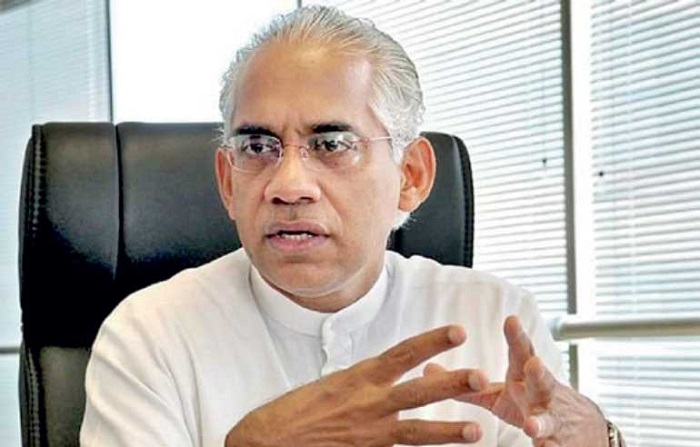
Samagi Jana Balawegaya (SJB) MP Eran Wickremaratne says the SJB opposes the transfer of Parliamentary powers to the Executive through the government’s proposed 21st Amendment to the Constitution.
Issuing a statement, the MP explained the SJB’s issues pertaining to the government’s proposed 21st Amendment to the Constitution.
Full statement:
Today the country is in bane with many crises, as a result of concentrating power around the Executive. The proposed 21st Amendment to the Constitution by the government, which appointed Ranil Wickremesinghe as Prime Minister, gives the President the power to keep under the purview subjects of his choice and even the power to dissolve Parliament. We are against the transfer of parliamentary power to the executive, which is independent of the executive and the judiciary, said Samagi Jana Balawege MP Eran Wickramaratne.
Addressing a media briefing held at the office of the Leader of the Opposition in Colombo today (25), MP Wickremaratne further said.
The Bar Association of Sri Lanka has also expressed concern that the 21st Amendment by the Minister of Justice will not reduce the powers of the President. They had proposed several amendments.
What are the current powers of the Executive President and the significant change in the powers of the Executive President after the proposed 21st Amendment?, the MP questioned.
When making appointments to senior government posts such as Provincial Governors, Secretaries to Ministries, and Ambassadors, the President should consult with the Prime Minister and appoint suitable officials. Since the Prime Minister operates within the framework of the Cabinet, there is ample scope to appoint suitable and experienced persons to such positions if the PM is made the head of the Cabinet. The various crises facing the country today do not arise if the line of separation of powers under the check and balances is well defined with the concept of good governance. He said even if the fuel and gas queues were over the country’s economic and administrative crisis would not be resolved, without an internationally recognized stable government.
The Constituent Assembly, which functioned under the 19th Amendment, as amended by 20A, increased the number of Parliamentarians and reduce the number of non-Parliamentarians. In the future, while reducing the number of MPs from 7 to 5, the number of non-members should be increased from 3 to 5.
He said that this should be introduced as a program to bring those who are fighting against corruption and fraud in the regime into governance.
MP Wickramarane referring to the SJB’s position on the taking over of the governance said that the Samagi Jana Balawewa has a plan to take over the government and solve the problems in the country. We mentioned this on several occasions, but we did not get that opportunity. If the SJB participates in the government, we told the President that the Executive powers of the President should be abolished or reduced. While this discussion was ongoing Ranil Wickremesinghe who came forward without any conditions was made the Prime Minister. We are ready to support and contribute as a team is needed to resolve the crisis facing the country.
The SJB Secretary introduced the 21st Amendment to Parliament. Meanwhile, the government has also now presented with the 21st Amendment. The government’s amendment brings back certain elements of the 19th Amendment but does not eliminate the executive presidency.
The basic tenet of the SJB amendment is that the President should act on the advice of the Prime Minister. The Prime Minister is a member of the Cabinet and the head of the Cabinet of Ministers. According to that theory, the government is governed with the recognition that the Prime Minister is the first among the peers in the Cabinet.
But the 21st Amendment proposed by the government does not have such a principle and it does not reduce the power of the President which the people are struggling to demand. Furthermore, the President can take over any subject related to public governance. However, with the 21st amendment proposed by the SJB, the President cannot take over any of the subjects at his whims and fancy. This is the boundary that separates the line of control under the check and balance of governance in developed countries.
Even when the 19th Amendment was introduced during the period of good governance, President Maithripala Sirisena was granted to carry on the subjects he was pursuing at that time as an interim arrangement until he was in power. However, the constitutional provisions that allowed future presidents to take over the subject of ministries were removed.
According to the amendments of the present government, the President can take over any subject. Accordingly, the 21st Amendment to the Constitution proposed by Minister Wijeydasa Rajapaksa will not make any significant changes that limit the executive presidency as expected by the people.
One appointment as the Governor of the Central Bank at the will of the Executive caused such an economic crisis in this country. The former central bank governor not only printed billions of rupees saying that printing money would not increase inflation but also wasted millions of rupees to artificially inflate the value of the Sri Lankan rupee.
Eran Wickremaratne said that by directing the governance structure of the country to the right path, other problems of the country could be solved and the country could be saved from disaster. He stressed that the system of empowering an individual to appoint officials should be changed immediately for the sake of the nation. (NewsWire)